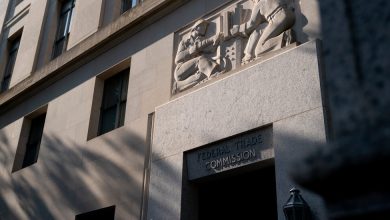A Blueprint for Suing Gun Makers Emerges


Remington’s settlement requires the company to release internal documents that may shed light on its marketing tactics.Credit…Seth Wenig/Associated Press
Watershed, or outlier?
The gun maker Remington yesterday agreed to pay $73 million to settle a lawsuit by families of nine Sandy Hook shooting victims over the AR-15-style rifle used in the 2012 massacre. It’s believed to be the largest such settlement by a gun manufacturer, but it also raises questions about whether these companies will be held accountable in future shootings.
The lawsuit found a novel workaround to a federal shield for gun makers. The Protection of Lawful Commerce in Arms Act, enacted in 2005 under President George W. Bush, has shielded manufacturers from being held liable for mass shootings. (A gun industry executive said it was the “only reason we have a firearms industry anymore.”) But the Sandy Hook families instead argued that Remington’s marketing of the weapon had violated Connecticut consumer law.
Following the families’ approach could be difficult:
-
States have a patchwork of consumer protection laws like Connecticut’s: New York has adopted one, and California lawmakers have introduced another such bill. But such measures are far from common, and legal experts had long questioned whether the federal shield would protect Remington as it has other gun manufacturers.
-
Gun industry executives also argue that the settlement was agreed to by insurers of Remington, which is bankrupt, and that solvent companies would mount more vigorous legal defenses.
The industry is expected to face more such lawsuits, as other victims of mass shootings test the legal strategy. Potentially helping their case is Remington’s obligation in the settlement to release thousands of pages of internal company documents that, the Sandy Hook families contend, could reveal intent to aggressively market firearms to troubled young men like the one responsible for the 2012 shooting. (That said, legal experts caution that Remington is unlikely to disclose anything that could create additional legal liability.)
HERE’S WHAT’S HAPPENING
Markets are still worried about Ukraine. U.S. stock futures are down, as Western officials cautioned that a Russian invasion of Ukraine was still possible. NATO officials said today that Moscow appeared to be increasing forces near the Ukrainian border, despite Russian pledges to withdraw troops.
More pandemic restrictions fall by the wayside. Disney won’t require fully vaccinated visitors to wear masks at its theme parks, while Tyson Foods said fully vaccinated workers at “some facilities” could begin removing their masks at work. And the Coachella and Stagecoach festivals won’t have mask, vaccination or testing requirements for attendees. The C.D.C. reportedly may loosen its mask guidance as early as next week.
Prince Andrew settles a sexual abuse lawsuit. The disgraced British royal will pay an undisclosed sum to Virginia Giuffre, who had accused him of raping her when she was a teenage victim of Jeffrey Epstein. Andrew, whose settlement comes just weeks before he was scheduled to sit for a deposition in the case, will also donate to charity.
A Moment of Change at CNN
- Jeff Zucker Resigns: The network’s president stepped down after failing to disclose a workplace relationship revealed during the Chris Cuomo inquiry.
- Chris Cuomo’s Downfall: The star anchor was fired for trying to help his brother, Andrew Cuomo, then the governor of New York, fight off a sexual harassment scandal.
- The Streaming Race: CNN+, a late arrival at the streaming party, is on a hiring spree. Can it get viewers already overwhelmed with options to pay?
- Direction in Flux: WarnerMedia, CNN’s parent company, is expected to be acquired later this year by Discovery Inc. in one of the nation’s largest media mergers.
Democrats weigh a gas tax holiday to allay inflation fears. The potential move, along with new initiatives in President Biden’s social spending plan, are meant to provide economic relief to voters ahead of November’s midterm elections. Meanwhile, consumer prices in Britain grew at an annualized rate of 5.5 percent last month, their highest level since 1992.
Goodbye, Facebookers; hello, Metamates. Now that Facebook’s parent company has renamed itself Meta, its workers have a new moniker as well. Mark Zuckerberg revealed the term yesterday in an internal presentation, though reaction among employees has been mixed.
A partisan fight stalls Biden’s Fed plans
Republicans yesterday delayed a crucial Senate Banking Committee decision that would have advanced President Biden’s five Fed nominees to the full Senate for a confirmation vote, citing concerns about one of the candidates. Democrats say the fight is hurting the central bank’s ability to combat an issue of bipartisan concern: inflation.
It’s all about Sarah Bloom Raskin, Biden’s pick to lead bank supervision at the Fed. Republicans have argued that the veteran Democratic policymaker is too liberal, citing her previous comments on climate-related regulation. Senator Cynthia Lummis of Wyoming has also raised a concern that a fintech start-up on whose board Raskin once sat received access to the Fed payments system, while new crypto banks in her state have not.
Democrats’ frustration was palpable. Because all of the nominees are being considered simultaneously, the holdup over Raskin’s nomination is delaying the reappointment of the Fed chairman, Jay Powell, as well. “It’s a pivotal moment in our economy,” said Senator Sherrod Brown of Ohio, the committee’s chairman. “We need a full Reserve board.” (At one point during yesterday’s proceedings, Senator Elizabeth Warren of Massachusetts muttered off-mic, “Can we just vote?”)
But it is unclear how Democrats can proceed. Senate rules require a majority of the committee to be physically present to vote. Brown, for now, is refusing to separate Raskin’s nomination from the others, but some experts say the only option is to negotiate with Republicans.
A big business on Wall Street faces scrutiny
The S.E.C. and the Justice Department are examining whether investment banks handling block trades, which help clients sell large positions in one company, improperly tipped off hedge funds to the transactions. The inquiries may lead to a shake-up of a major trading activity.
The S.E.C. has subpoenaed Morgan Stanley and Goldman Sachs, and federal prosecutors are also inquiring into the practice, The Times’s Matt Goldstein and Lananh Nguyen report. Among those reportedly facing scrutiny is Pawan Passi, a senior Morgan Stanley executive involved in the bank’s block-trading business, according to Bloomberg.
What are block trades? They’re typically used by publicly traded companies looking to buy or sell a large amount of stock quietly. Banks arrange those trades, soliciting buyers or sellers and often pocketing a lucrative fee. It has become big business for Wall Street, reaching $71 billion last year, up 33 percent from 2019, according to Dealogic. Morgan Stanley and Goldman Sachs have dominated the business in recent years.
Questions have dogged the practice for some time. Regulators are investigating whether bankers tipped off top clients, who then took advantage by betting against the companies whose stock was being sold. Share prices often fall because of the huge amount of shares hitting the market, but those drops have sometimes come hours before the block trades take place, a concern for regulators.
A 2018 study found patterns in which the best clients of the brokerage arranging a block trade regularly sold shares ahead of the transaction and bought them back once the trade had finished. A co-author of the study, Marco Di Maggio of Harvard Business School, said he had spoken with S.E.C. officials shortly before it was published. He has since been told the investigation closed a year or so after the study’s release.
Proving wrongdoing could be hard, experts say, since the nature of block trades require bankers to call their best clients to solicit their interest in the transaction. But Di Maggio told DealBook that something else appeared to be going on: “What we found is that systematically a brokerage firm’s best clients don’t buy into block trades, they sell,” he said. “If you are trying to build an order book, and every time you call those folks, they sell, then you should either stop calling them or act in better faith.”
“I had no idea what I was doing, but I knew this wasn’t it.”
— Rebecca Hellmann, who quit as the chief marketing officer of the health care start-up Olive in 2020 amid dissatisfaction with her work. She is one of a growing number of C-suite executives who joined the Great Resignation and are, at least for now, staying off the corporate track.
The secret assault accusation that upended CNN
The big story in the news media industry in recent weeks has been the surprise ouster of Jeff Zucker from CNN, ostensibly over his undisclosed relationship with the network’s chief marketing officer, Allison Gollust. (She resigned yesterday.) But The Times takes a look at the back story behind Zucker’s fall, including a fateful letter accusing Chris Cuomo, a former CNN anchor, of sexual assault.
Just a day after CNN suspended Cuomo as new details emerged about his efforts to aid his brother, Andrew Cuomo, the former governor of New York, with sexual harassment accusations, network executives received a letter from Debra Katz, a prominent sexual harassment lawyer.
-
In it, a woman who temped at ABC said that in 2011, Cuomo — then an anchor there — had assaulted her in his office.
-
Amid the rise of the #MeToo movement years later, Cuomo, now at CNN, proposed doing a segment on the company where the woman did P.R. The woman “suspected he was concerned about her coming forward publicly with her allegations,” Katz wrote in the letter to CNN. (Cuomo denies the letter’s accusations.)
Zucker fired Cuomo days after CNN received the letter. Soon after, a lawyer for Cuomo suggested he would seek to examine whether Zucker had also improperly communicated with Andrew Cuomo, and gossip arose that Zucker and Gollust had a yearslong undisclosed romantic relationship.
Who do you think got Elon Musk’s billions? We’re still fascinated by the news that the Tesla chief gave $5.7 billion to charity last year, but didn’t say where it went. There are speculations about possible recipients, including the U.N. World Food Program (which says it hasn’t received the money) or a donor-advised fund, a sort of charitable checking account used by the wealthy to reduce their tax burdens. But what do you think? Send us your guesses, and we may publish them in a future newsletter.
THE SPEED READ
Deals
-
The hedge fund Alden Global Capital is urging shareholders of Lee Enterprises to vote against the newspaper publisher’s board nominees, after a Delaware court rejected its own candidates. (The Times and Democrat)
-
A judge ruled that Altria didn’t violate antitrust laws by investing in the e-cigarette company Juul in 2018, rejecting arguments by the F.T.C. (WSJ)
-
SeaWorld said it was unlikely to continue pursuing Cedar Fair after its amusement park rival rejected its takeover bid. (MarketWatch)
-
“Icahn: The Restless Billionaire,” the new HBO documentary about Carl Icahn, takes a behind-the-scenes look at one of Wall Street’s most feared activist investors. (Bloomberg)
Policy
-
The S.E.C. is reportedly examining ties between the U.S. arm of Binance and two trading firms affiliated with the crypto exchange’s founder. (WSJ)
-
The Senate narrowly confirmed Dr. Robert Califf as commissioner of the F.D.A., despite bipartisan opposition to his nomination. (NYT)
-
U.S. officials accused the financial website Zero Hedge of spreading Russian propaganda. (AP)
Best of the rest
-
A woman appears to be the third patient ever to be cured of H.I.V., using a novel medical procedure. (NYT)
-
“What Can Replace Free Markets? Groups Pledge $41 Million to Find Out.” (NYT)
-
Novak Djokovic said he was willing to skip major tennis tournaments like Wimbledon over vaccine requirements. (NYT)
-
The N.Y.S.E. wants to become an exchange for buying and selling crypto and NFTs. (Bloomberg)
-
Crypto addiction is an increasingly common mental affliction, therapists say. (Quartz)
We’d like your feedback! Please email thoughts and suggestions to [email protected].




